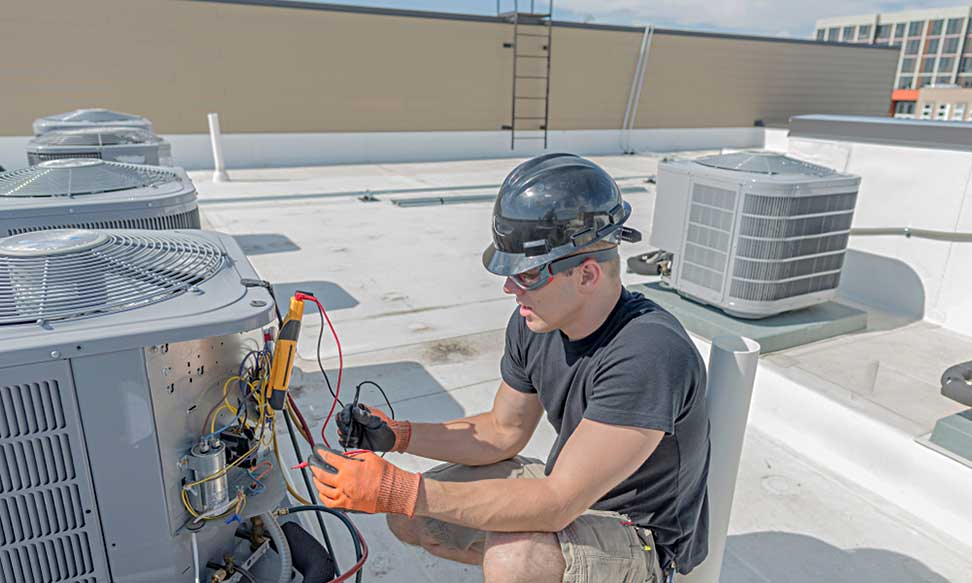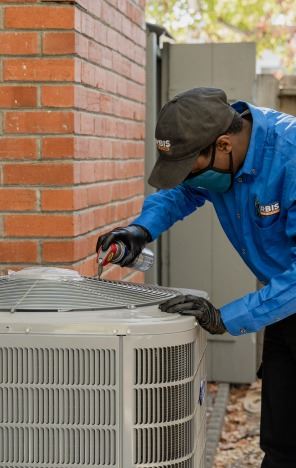Why ductless mini splits Outperform Traditional HVAC Systems
Selecting Between a Heat Pump and Heating System: Key Considerations for Your HVAC Requirements
When assessing home heating alternatives for heating and cooling requires, the choice between a warm pump and a heating system can be intricate. Each system provides distinctive benefits customized to certain climates and power performance goals. Understanding these distinctions is vital for making an enlightened option. Secret factors such as setup costs and environmental influence further make complex the choice procedure. Which alternative truly lines up with one's comfort and sustainability preferences? The adhering to areas will certainly explore these considerations in information.
Recognizing Warmth Pumps: How They Work and Their Advantages
While numerous home owners think about different heating choices, recognizing just how warm pumps function and their advantages can greatly affect their choice. Heatpump run by moving warmth rather than generating it. In the winter months, they draw out warmth from the outside air or ground and transfer it inside your home, while in the summer season, they reverse this procedure, cooling down the home by removing warmth outside. This twin capability makes them versatile for year-round climate control.One of the primary advantages of warm pumps is their power efficiency. They make use of considerably much less power compared to traditional furnace, potentially leading to reduced utility bills (furnace replacement). In addition, warm pumps have a smaller sized carbon footprint, making them an ecologically pleasant option. They likewise require much less upkeep than standard systems, adding to lasting expense savings. In general, comprehending the mechanics and benefits of heatpump can aid house owners make educated choices regarding their heating and cooling demands
Exploring Heaters: Kinds, Operation, and Benefits
Furnaces are available in different types, consisting of gas, electrical, and oil versions, each with distinct functional devices. Understanding these differences is necessary, as they influence performance and heating performance. Furthermore, heaters supply various benefits, such as consistent warm outcome and integrity in cooler climates.
Kinds of Heating systems
Heating systems can vary considerably in design and procedure, with heating systems being a preferred option among home owners. There are numerous sorts of heaters, each utilizing various fuel resources and modern technologies. Gas heaters prevail, leveraging natural gas to produce warm effectively. Electric furnaces, on the other hand, utilize electrical resistance to produce warmth, commonly favored for their simple installation. Oil heaters, while less usual, are effective in areas with limited gas access (furnace replacement). Additionally, condensing heating systems make best use of power efficiency by recycling and catching exhaust gases. Each kind runs with a system of warmth exchangers and ductwork to disperse warm air throughout a home. Recognizing the differences in between these heating system types is crucial for notified HVAC choices
Benefits of Heaters
For property owners looking for trusted warmth throughout cool months, the benefits of furnaces are significant. Heating systems give consistent home heating, making sure also temperatures throughout the home. They are particularly efficient in extreme cool, commonly outshining heat pumps in freezing conditions. Different types, consisting of gas, electrical, and oil heaters, supply flexibility to satisfy varied requirements and preferences.Furnaces also tend to have reduced initial installation expenses contrasted to heatpump, making them an extra easily accessible option for numerous. Their robust design contributes to a longer life-span, with several devices lasting over 15 years with correct upkeep. Furthermore, contemporary heating systems are commonly outfitted with sophisticated innovation for enhanced efficiency, which can lead to reduced power expenses. On the whole, heaters remain a reputable selection for effective home heating.

Energy Performance: Contrasting Heat Pumps and Furnaces
When comparing power performance between warm pumps and heaters, the Seasonal Power Efficiency Ratio (SEER) plays a crucial role in figuring out efficiency. In addition, an operational expense analysis exposes the lasting economic implications of each system. Understanding these elements can guide homeowners in making notified choices regarding their home heating solutions.
Seasonal Power Effectiveness Proportion
Power performance plays an essential role in the decision-making process between warm pumps and heating systems, especially when thinking about the Seasonal Power Performance Proportion (SEER) This statistics procedures the cooling effectiveness of heatpump over an entire air conditioning season, giving a standardized way to review performance. Greater SEER ratings suggest better power performance, equating to lower energy consumption and reduced utility costs. On the other hand, furnaces are generally assessed using the Yearly Gas Usage Performance (AFUE) ranking, which mirrors heating efficiency. When contrasting these 2 systems, house owners must prioritize SEER ratings for heat pumps, as they directly effect general energy financial savings and environmental sustainability. A detailed understanding of SEER can especially influence the long-term contentment and cost-effectiveness of the selected heating and cooling solution.
Functional Cost Analysis
Recognizing the operational expenses connected with warmth pumps and furnaces is essential for homeowners examining their alternatives. Warmth pumps usually offer greater energy effectiveness, converting electric power into warmth with minimal waste. This causes lower regular monthly energy bills, specifically in moderate climates. Conversely, conventional furnaces, particularly gas designs, might have reduced upfront expenses but can sustain higher functional expenditures in time as a result of sustain prices and effectiveness ratings.Moreover, heatpump can operate as both heating and cooling down systems, possibly decreasing the need for separate a/c systems. While first financial investments for warm pumps may be higher, their long-lasting financial savings in energy effectiveness can make them a more affordable choice for several houses. Careful analysis of neighborhood power rates is important to figure out you can check here the most effective option.
Installation Prices: What to Expect for Each Furnace
Setup costs for heating systems can differ significantly in between heatpump and heaters, affecting home owners' decisions. Heatpump usually have greater ahead of time setup expenses, generally varying from $3,500 to $8,000, depending upon the unit dimension and intricacy of installation. This consists of the outdoor device, interior handling system, and required ductwork adjustments. Conversely, heaters have a tendency to have reduced first expenses, averaging in between $2,500 and $6,000, which can be appealing for budget-conscious property owners. Installment expenses can boost if substantial ductwork is required.Moreover, the choice of gas type for furnaces-- natural gas, propane, or electric-- can additionally affect setup expenses. While heatpump supply power efficiency, their preliminary investment might prevent some buyers. Ultimately, reviewing installment expenses together with lasting financial savings and effectiveness will certainly help house owners in making educated choices concerning their furnace.
Climate Considerations: Which System Does Much Better in Your Location
Just how do environment conditions affect the efficiency of heating systems? The performance of warm pumps and heating systems can differ substantially depending on the regional climate. In moderate climates, warm pumps excel by successfully moving warm from the outdoors air, making them an energy-saving alternative. Nonetheless, their performance reduces in incredibly chilly temperatures, where they might have a hard time to remove enough warmth. On the other hand, heating systems, specifically gas designs, give dependable and regular heat regardless of exterior conditions, making them more suitable in colder regions.In locations that experience milder wintertimes, heatpump can run properly year-round, offering both home heating and air conditioning. On the other hand, areas with harsh winter seasons frequently take advantage of the toughness of heating systems. Ultimately, recognizing the local climate is vital when determining between a heatpump and a heating system, as it directly impacts their operational efficiency and general efficiency.
Maintenance Demands: Long-Term Take Care Of Heat Pumps vs. Furnaces
While both heatpump and heaters call for routine maintenance to ensure peak performance, their details requirements and care routines differ considerably. Furnaces generally need less regular interest, with yearly assessments being sufficient to look for gas leakages, clean filters, and examine overall performance. Their easier design typically allows for uncomplicated repairs.In comparison, warmth pumps necessitate semiannual upkeep as a result of their double duty in heating & cooling. This consists of cleaning coils, inspecting cooling agent levels, and making sure that both the indoor and outside systems operate at their best. Furthermore, heat pump maintenance usually includes even more detailed elements, making specialist maintenance essential.Neglecting maintenance can cause decreased performance and enhanced energy expenses for both systems. Inevitably, property owners need to take into consideration these long-term care demands when choosing in between a heatpump and a heater, as positive maintenance can expand the life-span and efficiency of either system considerably.
Ecological Influence: Choosing a Sustainable Home Heating Option
The ecological impact of heating unit is a critical analysis for house owners looking for sustainable options. Heat pumps are normally more energy-efficient than traditional heaters, as they move warm instead of create it, greatly lowering carbon emissions. By utilizing renewable resource resources, such as air-source or geothermal heatpump, house owners can further reduce their eco-friendly footprint.On the various other hand, natural gas furnaces release greenhouse gases and add to air contamination, though they frequently provide higher warm result. However, innovations in modern technology have actually find out this here caused the development of high-efficiency heaters that decrease emissions.Ultimately, picking a heating unit includes evaluating efficiency against ecological impact. Homeowners are motivated to review regional power resources and incentives for renewable systems, making certain a selection that straightens with both individual comfort and ecological responsibility. The decision affects not only prompt comfort yet likewise long-lasting sustainability and environmental health.
Regularly Asked Concerns
Exactly How Lengthy Do Warm Pumps and Furnaces Typically Last?
The life-span of warm pumps normally varies from 15 to twenty years, while heating systems can last in between 15 to thirty years. Regular maintenance considerably impacts their longevity and efficiency in providing heating remedies.
Can I Make Use Of a Warm Pump in Exceptionally Cold Climates?
Heat pumps can operate in very cold environments, however their performance reduces as temperatures decline. In such conditions, supplementary home heating resources may be essential to keep comfortable indoor temperatures and Check This Out ensure peak performance.

What Is the Sound Degree of Heat Pumps Versus Furnaces?
The sound degrees of heat pumps and heating systems vary significantly. Generally, warm pumps operate even more quietly than traditional furnaces, making them more suitable for those conscious appear, while furnaces might create louder operational noises during heating cycles.
Are Warm Pumps Suitable for Both Home Heating and Cooling?
Warmth pumps are undoubtedly suitable for both home heating and air conditioning (heat pump installation ooltewah tn). They operate by transferring heat, giving reliable temperature level control year-round, making them a functional choice for property owners seeking an all-in-one heating and cooling option
What Size Heating System Do I Required for My Home?
Establishing the ideal size furnace for a home needs examining elements such as square video footage, insulation high quality, neighborhood climate, and the home's format. Consulting an expert can ensure an accurate assessment and excellent convenience. Warm pumps usually provide greater energy performance, converting electrical power into heat with minimal waste. In moderate climates, warmth pumps stand out by successfully moving warm from the outdoors air, making them an energy-saving choice. Conversely, furnaces, specifically gas designs, supply constant and reliable heat regardless of exterior problems, making them more effective in chillier regions.In locations that experience milder winters, warm pumps can operate effectively year-round, giving both heating and cooling. Heat pumps are usually more energy-efficient than traditional heaters, as they transfer warm rather than create it, greatly reducing carbon emissions. By making use of eco-friendly energy resources, such as geothermal or air-source heat pumps, home owners can even more reduce their eco-friendly footprint.On the other hand, natural gas furnaces send out greenhouse gases and add to air contamination, though they usually supply higher warmth outcome.